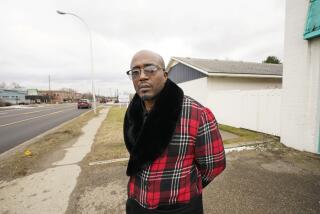Why Get in Trouble When You Can Lie?
- Share via
Yesterday my wife and I discovered that one of our closet doors was broken. After a bit of back and forth, it emerged that our older son had broken it when he was roughhousing with his brother. He hadn’t told us, he said, because he was afraid of getting in trouble.
I thought of that when I saw this story:
FORT WORTH, Texas (AP)--A nurse’s aide hit a homeless man with her car, drove home with him stuck headfirst in her broken windshield, and ignored his cries for help as he bled to death in her garage over the next two or three days, police say.
One of the most disturbing features of the story is that the nurse’s aide, Chante Mallard, allegedly told police she periodically went into the garage to apologize to the man for hitting him and leaving him to die in her windshield.
Someone had taught her, no doubt, that if you do something bad you should apologize, thus accepting responsibility.
Philosophers and pundits like to rant in the teeth of modernity that no one takes responsibility for anything anymore.
Former drug czar William Bennett, for example, has made a career of bemoaning our era and our former president on these grounds.
But it’s always been hard to take responsibility for something bad. The first impulse really is to lie or say nothing, to be invisible to moral radar with your stealth technology.
I don’t know Chante Mallard, but I picture her letting the man bleed and starve in her garage because she didn’t want to get into trouble. It was a lie of silence.
When philosophers discuss good and evil, they often do it, as Aristotle did, in terms of virtues such as courage or temperance. Others, called utilitarians, say that you must relieve as much suffering and cause as much pleasure as possible. Yet others, such as Immanuel Kant, say that you must do what is in accordance with duty or a moral law that ultimately has its origin in God.
No doubt Chante Mallard fails on all counts. But the various theories, though they can condemn her, don’t explain exactly what is wrong with Mallard. The best way to say what Mallard allegedly did is to say that she couldn’t face or tell the truth, which was that she did something wrong or harmful.
It is easy to predict that when she stands trial for murder, she will plead insanity and enumerate a variety of psychological problems. When finally arrested, she allegedly told police that she had been drinking and taking Ecstasy. The drinking and drugs are likely to figure in her defense.
Then she’ll be claiming “diminished responsibility” on the grounds that her mental state did not allow her to fully intend her action, or that she could not understand her action’s moral implications. That goes for her friends, too, who allegedly helped her dump the body.
But perhaps responsibility does not actually require sanity. Perhaps we are responsible for what we do no matter what our state of mind at the time.
Perhaps all that responsibility asserts is that the actions we take are our own actions. Perhaps taking responsibility--on the trivial level that my son needed to or on the monstrous level that Chante Mallard needs to--is saying the horrible truth and taking the consequences.
*
Crispin Sartwell teaches ethics at the Maryland Institute College of Art.
More to Read
Sign up for Essential California
The most important California stories and recommendations in your inbox every morning.
You may occasionally receive promotional content from the Los Angeles Times.













